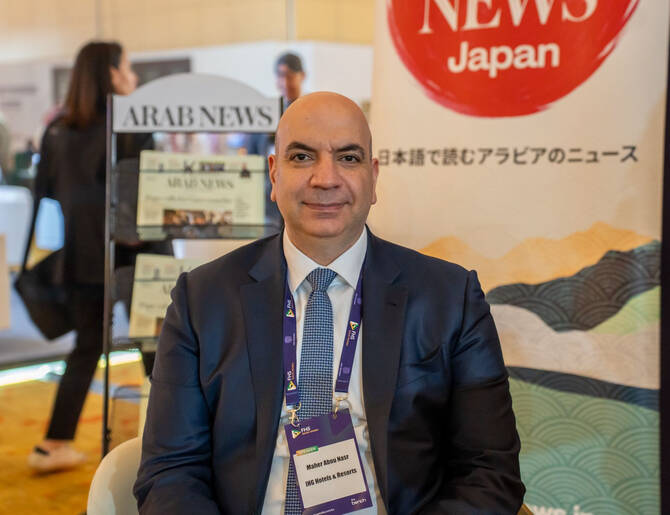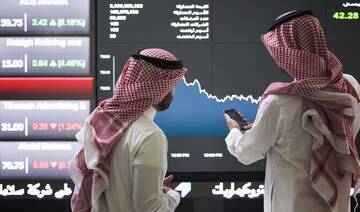RIYADH: UK multinational hospitality giant IHG Hotels and Resorts is planning to add an additional 15,000 rooms in Saudi Arabia, as it eyes opening another 50 hotels in the Kingdom by 2030, according to an official.
Speaking to Arab News on the sidelines of the Future Hospitality Summit in Riyadh on May 12, Maher Abou Nasr, vice president of operations for IHG in Saudi Arabia, said that the company will add seven new hotel brands in the Kingdom, in addition to the existing six already operating in the country.
Strengthening the hospitality sector is one of the crucial goals outlined in Saudi Arabia’s Vision 2030, as the Kingdom is steadily diversifying its economy by reducing its decades-long reliance on crude revenues.
Ahead of the summit, FHS data revealed that Saudi Arabia is set to add 362,000 new hotel rooms by 2030 as part of its $110 billion hospitality expansion plans.
“We have 45 hotels in the market now, and it includes Makkah, Madinah, Riyadh and all the tourism cities in the Kingdom. And that is close to 24,000 keys currently operating in the market. But our pipeline has 50 hotels. So, more hotels are coming to the market, with 15,000 keys that we are going to be introducing soon,” said Abou Nasr.
He added: “We have six brands that are operating currently in the Kingdom, but we have seven brands in the pipeline. So we’re going to have 13 brands, in close to five years, that are going to be operating in the Kingdom.”
Abou Nasr further said that IHG is gearing up to meet the rising demand in Saudi Arabia’s hospitality sector, with the Kingdom gearing up to host major international events including Expo 2030 and the FIFA World Cup in 2034.
Abou Nasr said that 49 percent of the company’s workforce are Saudi nationals, and the new hotel brands will help workers from the Kingdom explore more opportunities in the hospitality sector.
“Those Saudi youth who are going to be working in the Expo and the World Cup are people who are graduating today from high school. They are making their decisions on their career paths today, this year, last year, and in the coming year. So, in this period, we need to reach this pool of talent and attract them to the hospitality industry,” said Abou Nasr.
“Today we have 49 percent Saudization. Close to 2,000 Saudi nationals work in our hotels, but we want to reach 6,000 by 2030 to be working for us,” he added.
Abou Nasr added that IHG is getting sufficient support from the Kingdom’s Ministry of Tourism to attract Saudi talents to the company’s workforce.
Meeting diversification of demand
According to Abou Nasr, IHG is trying to cater to the needs of demand in different segments, such as midscale and upper midscale, in addition to the traditional luxury offerings provided by the hospitality group.
“With all the changes that are happening in the Kingdom, we see a big diversification of demand. Not everybody wants to stay in luxury hotels all the time. Having said that, luxury remains our biggest part of the portfolio that’s coming — 60 percent of our pipeline hotels are in the luxury and lifestyle segments,” said Abou Nasr.
He added: “However, we still see demand now that is coming into different segments, like the midscale and upper midscale. So, Holiday Inn Express is coming to the market, and we’re introducing Garner as well, sometime in the near future, to the Kingdom.”
On the first day of the FHS, IHG and Ashaad Co. signed an agreement to develop three new hotels in Saudi Arabia: Intercontinental and Voco in Alkhobar and Hotel Indigo in Jeddah.
Citing a presentation made by real estate consultancy JLL at the summit, Abou Nasr said that Saudi Arabia had committed to adding 185,000 keys as part of its offering for FIFA World Cup 2034, and not all of these keys will be in luxury segments.
Abou Nasr highlighted the growth of the hospitality industry in Saudi Arabia, and said that hotels in Riyadh and Jeddah have started to make profits within one or two months of starting operations.
“In the past, that used to be a few months before we break even and then start ramping up toward more profits. Today, we are seeing a lot of hotels making profits from the first or second months,” said Abou Nasr.
He added: “There’s a lot of demand that is happening in those cities. It depends on the location, the brand and the size of the hotel. But hotel investments are proving to be very profitable in this market.”
Maintaining competitiveness
During the interview, Abou Nasr said that IHG is committed to maintaining competitiveness in the market, as the company plans to add 50 new hotels in addition to the 45 already operating in the Kingdom.
“We are actively working toward renovating many of those hotels that need renovation and bringing them up to speed to cater for the new travelers that are coming to Saudi Arabia,” he said.
Abou Nasr added that IHG, during the recently concluded Arabian Travel Market, signed a memorandum of understanding with the Ministry of Tourism to collaborate around enhancing the guest experience when travelers come to Saudi Arabia.
Abou Nasr further said that IHG is committed to maintaining sustainability as the world is trying to materialize the climate goals.
“We’re working on introducing three energy conservation measures into our hotels that will take care of water conservation within our properties and energy conservation as well. In the future, there are a lot more initiatives to come. This is all guided by our journey to tomorrow, which are our sustainability initiatives at a corporate level,” he added.
Combating challenges
Abou Nasr said cooperation with the government has helped IHG to change challenges into opportunities.
He added that completing the projects within the stipulated timeframes and renovating existing facilities are some of the challenges which are being faced by IHG.
“We firmly believe that Saudi hospitality is delivered by Saudis. And we’re able now to go and talk to those Saudis at that young age to attract them to the industry with help from the government,” said Abou Nasr.























